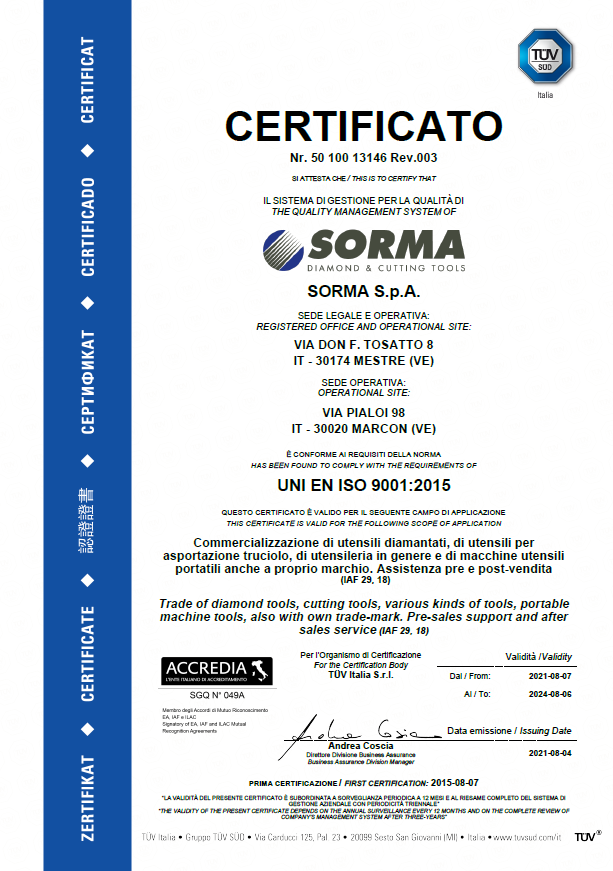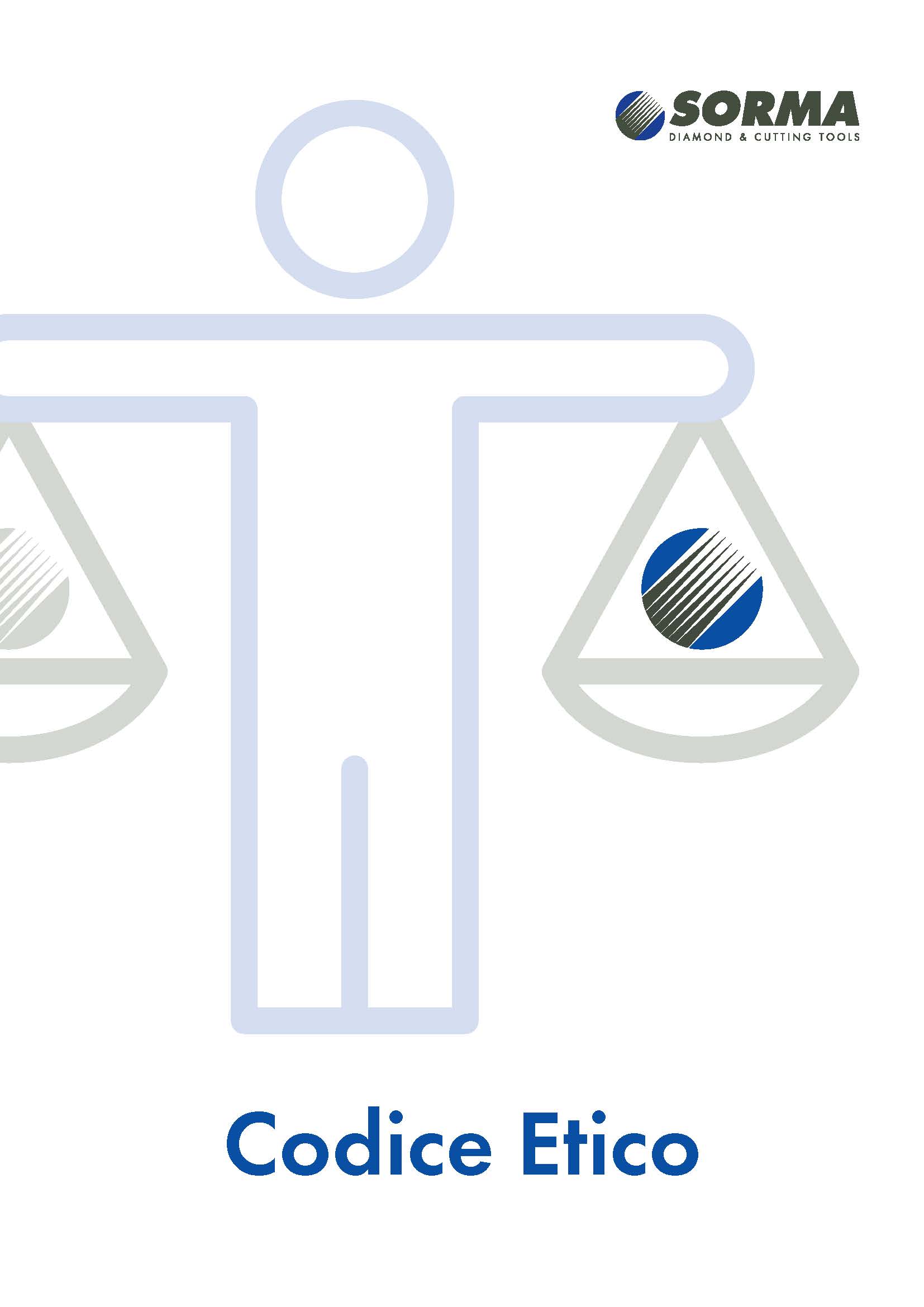Our certification
Since 2000 Sorma has undertaken an efficiency program for all company processes. It is aimed at optimising the work of all the divisions, so as to offer high-quality products and excellent service.
Every year we go through certification review for ISO 9001, with a highly qualified certification authority, and we engage each and every department in the company in process improvement. We have developed high sensitivity regarding procedures aimed at improving the work of each member of Sorma, and at making teamwork fluid and organic. Teamwork is fundamental in an organisation as complex as Sorma has become over the years. For this reason everyone’s strong commitment is needed to promote company excellence, both for enhancing and for harmonising individual potential in process areas which must necessarily lead to synergies and the sharing of numerical and qualitative goals. Quality certification for Sorma is not a mere bureaucratic procedure to be followed, but rather a key to continuous development and, with this assumption, each year we welcome the review process as an opportunity to look carefully at ourselves and see what we can improve.
ISO 9001
The ISO 9001 standard defines system requirements for an organisation’s quality management. Here is the most recent version of Sorma’s certificate, available to download in PDF format.
Code of Ethics
The Code of Ethics is approved by Sorma’s Board of Directors and ratified by the Shareholders' Meeting. This Code of Ethics expresses the commitments and ethical responsibilities to which the behaviour of Sorma’s Directors, shareholders, employees, consultants and external collaborators, client or supplier companies, as well as all those who have relationships with the Company are bound.
Honesty, transparency and respect are the strong imprint given by Sorma's founding members in 1950, values that still characterise the way the Company operates today.
In fact, Sorma’s Board of Directors and corporate structure are well aware that the individual behaviours of each member affect the reputation and reliability of the entire Company.
That is precisely why respect for the law, respect for the fundamental rights of everyone, fairness and transparency in business relations, the adoption of principles of legitimate competition, innovation, the health and safety of employees and all those who come into contact with the Company, the protection of diversity, as well as social and environmental responsibility must always be at the very centre of corporate action.
In no way can the conviction of acting for the benefit of Sorma justify the adoption of behaviours that are contrary to corporate principles and values.
Code of Ethics
It is the document that contains the principles around which Sorma inspires its business activities
Organisational Model pursuant to Legislative Decree 231/2001
As part of the process of strengthening its identity, value and governance-related elements, Sorma S.p.A. has, for quite some time, launched a project aimed at implementing and consolidating an Organisation, Management and Control Model in accordance with the provisions of Legislative Decree 231/2001.
What is the Model?
The Organisational Model 231 is the document that describes the corporate procedures that guarantee the prevention of the commission of crimes, for which the Company could be held responsible in the fulfilment of all the tasks and duties envisaged during the performance of business activities.
Purpose of the Model
The purpose of the Model is the implementation of a structured and organic system of prevention, deterrence and control, to develop awareness of the risk of committing a crime in individuals who directly or indirectly are involved in sensitive activities. By constantly monitoring the activities carried out, the Model makes it possible to prevent or to promptly react to prevent the commission of offences.
The Supervisory Body (SB) pursuant to Legislative Decree 231/2001 is the corporate body that verifies and monitors the effectiveness and compliance with the Organisational Model 231, reports any eventual violations, anomalies and deficiencies thereof, updating the Model where necessary.
Whistleblowing
Whistleblowing, or reporting an alleged wrongdoing, is a corruption prevention system.
The legal institution of whistleblowing was introduced in Italy by Law no. 190 of 6 November 2012 “Provisions for the prevention and repression of corruption and illegality in public administration”, approved by incorporating the recommendations and obligations associated with membership of the UN, OECD, Council of Europe and the European Union.
Sorma has adopted a specific procedure for the management of reports on:
- violations of the provisions of corporate procedures, internal handbooks, the Organisation, Management and Control Model pursuant to Legislative Decree 231/2001;
- violations of European laws, regulations and standards;
- conduct in violation of the principles and/or rules of conduct defined in the Code of Ethics.
The Supervisory Body (SB) must be informed (see the “How to report” section) by employees, corporate bodies, consultants and external collaborators, about events that could give rise to Sorma’s responsibility pursuant to Decree Law 24/2023 in implementation of Directive (EU) 2019/1937.
What to report
Some non-exhaustive examples of possible reports include:
- situations of conflict of interest considered unknown to the Company;
- acts of corruption of third parties towards employees or by the latter towards third parties;
- fraud;
- improper use of Company assets;
- intentional communication of false information to Public Administrations;
- eventual violations of national and European Union regulations;
- accounting irregularities;
- false statements;
- violation of environmental and occupational safety regulations.
What is not included in the reports
The following are not included in the reports:
- mere suspicions or rumours;
- personal complaints by the whistleblower;
- claims relating to the employment or collaboration relationship;
- claims relating to relations with hierarchical superiors or colleagues.
How to report
Reports must reach the SB and can also be made anonymously. One of the following reporting methods can be chosen:
- sending an email to the whistleblowing.sorma@gmail.com mailbox specially set up outside the corporate domain;
- by letter to the following postal address: Supervisory Body, c/o Sorma Via Don Tosatto 8, 30174 Venice Mestre, Italy;
- in person, requesting an appointment with a member of the SB by calling +39 041 2388911, c/o Sorma Administrative Office switchboard.
All these reporting channels are considered suitable to guarantee the confidentiality of the identity of the whistleblower.
The SB evaluates the reports received and any consequent measures applicable in accordance with the provisions of the sanctioning system.



